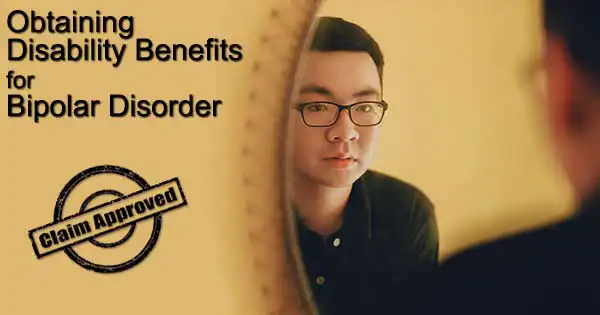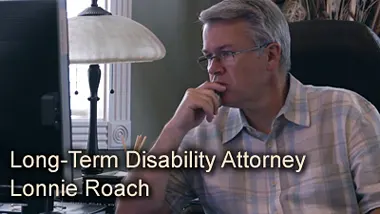Obtaining disability benefits for Bipolar Disorder 2024
Author: Attorney Lonnie Roach
Updated: 7/15/2024
Can I get disability benefits if I am suffering from the effects of Bipolar Disorder?
To qualify for Disability Benefits due to bipolar disorder, you must meet the criteria outlined in the Blue Book. This includes having a diagnosis of bipolar disorder and exhibiting at least three symptoms such as pressured speech, distractibility, and inflated self-esteem. Additionally, you must show limitations in certain areas of mental functioning, such as interacting with others or adapting to new situations. It is crucial to provide complete and accurate medical records to support your claim.
Can I get disability benefits if I am suffering from the effects of Bipolar Disorder?
Bipolar disorder affects one in 40 American adults and is the sixth leading cause of disability worldwide. Sometimes called manic depression, bipolar disorder is a mental illness that causes drastic shifts in a person’s mood, energy, and ability to function. Bipolar disorder affects men and women equally and it can take an average of 10 years from the appearance of initial symptoms to diagnosis. If you are suffering from the effects of Bipolar disorder you may qualify for disability benefits.

People with bipolar disorder vacillate between periods of extreme happiness and excitement and episodes of deep depression.
The condition is called bipolar because there are two “poles” of mood. Manic refers to periods when the individual feels excited and happy, while depressive defines the periods when the individual feels hopeless or worthless.
People with bipolar disorder experience periods of intense emotion, changes in sleep patterns and activity levels, and exhibit unusual behaviors.
Symptoms vary from person to person and can become more or less severe over time. These “mood episodes” are radically different from behaviors typical for that person; they do not follow a particular pattern and may occur over weeks, months, or years.
Any and all of the symptoms of Bipolar Disorder can make it very difficult to maintain employment.
What do I need to qualify for Social Security Disability Income?
The Social Security Administration recognizes that the symptoms of bipolar disorder can interfere with a person’s daily routine and prevent you from working.
Bipolar disorder is listed in Social Security’s Blue Book as a disabling impairment under Section 12.04 Depressive, bipolar and related disorders; you will likely qualify for disability benefits if your symptoms match the requirements of this listing.
You must have a diagnosis of bipolar disorder and must show at least three of the following symptoms:
- “Pressured speech” – unnaturally fast and frenzied speech
- Increase in physical agitation, such as pacing or restless busyness
- Distractibility
- Quickly changing ideas and thought patterns
- Decreased need for sleep
- Inflated self-esteem
- Involvement in risky activities with painful consequences you don’t recognize
Additionally, you must show an extreme limitation of one, or marked limitation of two of the following areas of mental functioning. Keep in mind that “extreme” means debilitating and “marked” means intense.
- Understanding, remembering, or applying information
- Concentrating, persisting, or maintaining pace
- Interacting with others
- Adapting or managing oneself; i.e., your ability to control your behavior, adapt to new situations, and personal skills such as cooking and dressing.
You may also qualify under this listing if you can show you are unable to function without a support system such as social workers, living in a group home, or with help from family or personal caretaker.
You must have a medically documented history of bipolar disorder that has existed for at least two years and evidence of the following:
- Medical treatment, mental health therapy, psychosocial support, or a highly structured setting, such as a group home, that is ongoing and diminishes the symptoms and signs of bipolar disorder; AND
- You have minimal capability to adapt to changes in your environment that are not part of your daily life

If your symptoms aren’t considered extreme or marked, you may be found “vocationally” disabled if you have the right medical evidence.
Social Security will do a Residual Functional Capacity assessment (RFC) to determine if there are any skilled or unskilled jobs you can do given your age, education, and whether or not you can drive. Most jobs, even those with few demands, require employees to be on time and follow instructions. If you have difficulty concentrating and are easily distracted, or call in sick frequently because of depressive episodes, it’s unlikely you can maintain full-time employment.
“Once Social Security determines the limitations caused by your condition, they will employ a vocational expert to assess whether a person with these limitations is employable. Most vocational experts will find a person to be unemployable if their condition or the treatment rendered for the condition causes the person to regularly be absent two or more days a month or be “off-task” 15% or more of the workday.”
You will need to provide complete and accurate medical records to Social Security as evidence of your claim, including:
- Names and locations of your doctors and other healthcare professionals
- Dates of doctor visits and hospitalizations
- Doctors’ notes and observations
- Medications you’ve taken, your reactions and any side effects
- Reports of mental status exams showing abnormality in thinking
- Reports from hospitalizations
- Other treatments you have tried

What do I do if my medical records show evidence of drug or alcohol abuse?
A person with bipolar disorder may have struggled with drug or alcohol abuse (DAA) at one time, or continue to struggle with DAA – this is not uncommon. Social Security won’t immediately deny your claim if your medical records show evidence of DAA; instead, the agency will attempt to determine if limitations caused by bipolar disorder would still exist if you hadn’t used drugs or alcohol. Because symptoms of bipolar disorder are similar to DAA, you should establish a period of sobriety while you’re receiving medical treatment to give Social Security an idea of your mental health without the effects of DAA.
Your age or another medical condition may help you get approval.
Though most people with bipolar disorder are diagnosed in their early teens or 20s, bipolar disorder can occur at any age and is often misdiagnosed.
Social Security follows a set of rules to determine when the agency expects an applicant to learn a new job; applicants who are 55 or older often fall under a grid rule, which means they are not expected to learn a new job. For example, a 55-year-old applicant who has no transferable skills might be found disabled. If you can’t go back to your old job, and you don’t have the skills to learn a new one, Social Security will likely grant you disability benefits.
An Austin client suffered from Bipolar disorder and took lithium and lexapro for this condition.
She was dysphoric and had cognitive deficits secondary to her Bipolar illness. She suffered from decreased memory, poor organizational skills, poor executive functioning, and low frustration and stress tolerance. According to her treating psychiatrist, she was totally disabled from this condition. She had been found totally disabled by the Social Security Administration. Furthermore, because of the significant mental impairments caused by her condition, the Administrative Law Judge who decided our client’s social security disability claim made a finding that the evidence suggested she was not capable of managing her own funds.
MetLife withheld payment of her claim after two years based upon the policy’s 24-month mental health limitation. However, we demonstrated that bipolar disorder was not subject to those limitations and we were able to get her benefits reinstated.
Your Free Initial Consultation
Call now:
At Bemis, Roach and Reed, if we can't help you, we will try to find the right attorneys for you.
We offer each of our prospective clients a free no obligation one hour phone or office consultation to see if we can help you and if you are comfortable with us. We know how difficult a time like this can be and how hard the decisions are. If we can be of assistance to you and help you find a solution to your issue we will even if that means referring you to another attorney.

Let's get you Started:
If you could provide us with some basic information about your claim we will get right back with you with a free case evaluation and schedule your Free Consultation Today.
You can also email us at: contact@brrlaw.com
Disability Benefits FAQs
Social Security has some basic financial requirements.
Before you are eligible for Social Security disability benefits, you must satisfy some basic financial requirements. You must: 1) have a disability that has lasted or is expected to last 12 months; and 2) you must have worked in a job where you paid Social Security taxes long enough and recently enough; and 3) you must not earn more than Substantial Gainful Activity (SGA), which is $1,550 per month in 2024 for nonblind applicants and $2,590 per month for blind applicants.
Basic SSDI Requirements –>
You may also be eligible for Social Security Disability benefits if you have another medical condition.
One disorder alone may not meet the criteria of an impairment as stated in Social Security’s Blue Book, but if you have more than one medical condition, Social Security must consider how those health issues combined limit your ability to hold a job and perform necessary daily tasks.
Disability for Multiple Impairments –>
If you are 55 or older or have another medical condition you may get approval.
Applicants who are 55 or older often fall under a grid rule, which means they are not expected to learn a new job.
Disability for those over 55 –>
You may also be eligible for Social Security Disability benefits if you have another medical condition.
One disorder alone may not meet the criteria of an impairment as stated in Social Security’s Blue Book, but if you have more than one medical condition, Social Security must consider how those health issues combined limit your ability to hold a job and perform necessary daily tasks.
Disability for Multiple Impairments –>
Should you file a claim?
If you believe that you meet Social Security’s medical and financial requirements, you should apply for benefits. If you are still unsure or would like to talk to someone, please contact us at 512-454-4000. We are always ready to take your call and discuss your options with you free of charge. We are happy to help folks just like you find the best solution for their personal situation.
How do I file for Social Security Disability benefits?
Once you have decided to file a claim, you can take the first step and apply for Social Security Disability benefits in person at your local Social Security Administration office, online, or over the phone.
How to Apply for SSDI –>
Appealing denied benefits
Most who file are denied initially. That doesn’t mean you won’t qualify; you just need to file an appeal.
There are four steps to the Social Security appeal process.
SSDI Appeals Process –>
Do I need a disability attorney for SSDI?
You may certainly file a claim on your own, but evidence shows that your chances for approval are increased significantly if you have legal representation.
Do I need an SSDI attorney–>
What if I don’t qualify for SSDI?
If you haven’t worked long enough to earn enough work credits, or if you earn too much income, you may be eligible for disability benefits through another Social Security program, such as Supplemental Security Income (SSI), or from a long-term disability insurance plan through your employer or a privately purchased policy.
What is Supplemental Security Income or SSI?–>
I have long-term disability insurance – should I file a claim?
Absolutely – you should file a claim as soon as you become disabled.
LTD Disability Appeals Process–>
Disability benefits are an important source of income for those who are unable to work. If you are not able to work due to accident or illness, you may be eligible for Social Security Disability or Long Term Disability benefits. If you have applied for benefits and been denied, contact the attorneys at Bemis, Roach and Reed for a free consultation. Call 512-454-4000 and get help NOW.
 Author: Attorney Lonnie Roach has been practicing law for over 29 years. He is Superlawyers rated by Thomson Reuters and is Top AV Preeminent® and Client Champion rated by Martindale Hubbell. Through his extensive litigation Mr. Roach obtained board certifications from the Texas Board of Legal Specialization. Lonnie is admitted to practice in the United States District Court - all Texas Districts and the U.S. Court of Appeals, Fifth Circuit. Highly experienced in Long Term Disability denials and appeals governed by the “ERISA” Mr. Roach is a member of the Texas Trial Lawyers Association, Austin Bar Association, and is a past the director of the Capital Area Trial Lawyers Association (Director 1999-2005) Mr. Roach and all the members of Bemis, Roach & Reed have been active participants in the Travis County Lawyer referral service.
Author: Attorney Lonnie Roach has been practicing law for over 29 years. He is Superlawyers rated by Thomson Reuters and is Top AV Preeminent® and Client Champion rated by Martindale Hubbell. Through his extensive litigation Mr. Roach obtained board certifications from the Texas Board of Legal Specialization. Lonnie is admitted to practice in the United States District Court - all Texas Districts and the U.S. Court of Appeals, Fifth Circuit. Highly experienced in Long Term Disability denials and appeals governed by the “ERISA” Mr. Roach is a member of the Texas Trial Lawyers Association, Austin Bar Association, and is a past the director of the Capital Area Trial Lawyers Association (Director 1999-2005) Mr. Roach and all the members of Bemis, Roach & Reed have been active participants in the Travis County Lawyer referral service.


![]()

